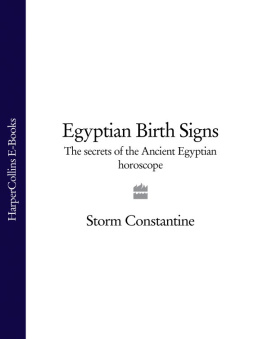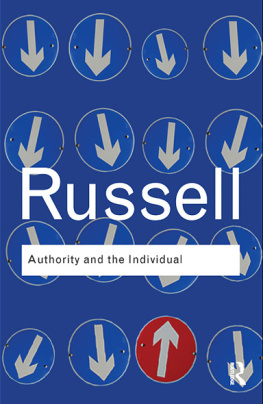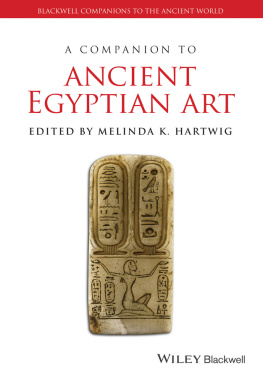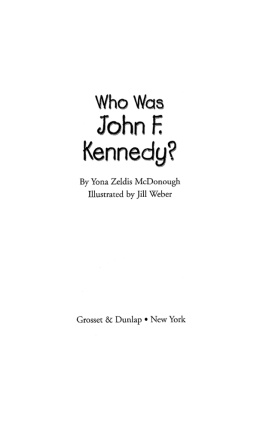Yona Sheffer - The Individual and the Authority Figure in Egyptian Prose Literature
Here you can read online Yona Sheffer - The Individual and the Authority Figure in Egyptian Prose Literature full text of the book (entire story) in english for free. Download pdf and epub, get meaning, cover and reviews about this ebook. year: 2018, publisher: Taylor & Francis (CAM), genre: Politics. Description of the work, (preface) as well as reviews are available. Best literature library LitArk.com created for fans of good reading and offers a wide selection of genres:
Romance novel
Science fiction
Adventure
Detective
Science
History
Home and family
Prose
Art
Politics
Computer
Non-fiction
Religion
Business
Children
Humor
Choose a favorite category and find really read worthwhile books. Enjoy immersion in the world of imagination, feel the emotions of the characters or learn something new for yourself, make an fascinating discovery.

- Book:The Individual and the Authority Figure in Egyptian Prose Literature
- Author:
- Publisher:Taylor & Francis (CAM)
- Genre:
- Year:2018
- Rating:4 / 5
- Favourites:Add to favourites
- Your mark:
- 80
- 1
- 2
- 3
- 4
- 5
The Individual and the Authority Figure in Egyptian Prose Literature: summary, description and annotation
We offer to read an annotation, description, summary or preface (depends on what the author of the book "The Individual and the Authority Figure in Egyptian Prose Literature" wrote himself). If you haven't found the necessary information about the book — write in the comments, we will try to find it.
Yona Sheffer: author's other books
Who wrote The Individual and the Authority Figure in Egyptian Prose Literature? Find out the surname, the name of the author of the book and a list of all author's works by series.
The Individual and the Authority Figure in Egyptian Prose Literature — read online for free the complete book (whole text) full work
Below is the text of the book, divided by pages. System saving the place of the last page read, allows you to conveniently read the book "The Individual and the Authority Figure in Egyptian Prose Literature" online for free, without having to search again every time where you left off. Put a bookmark, and you can go to the page where you finished reading at any time.
Font size:
Interval:
Bookmark:
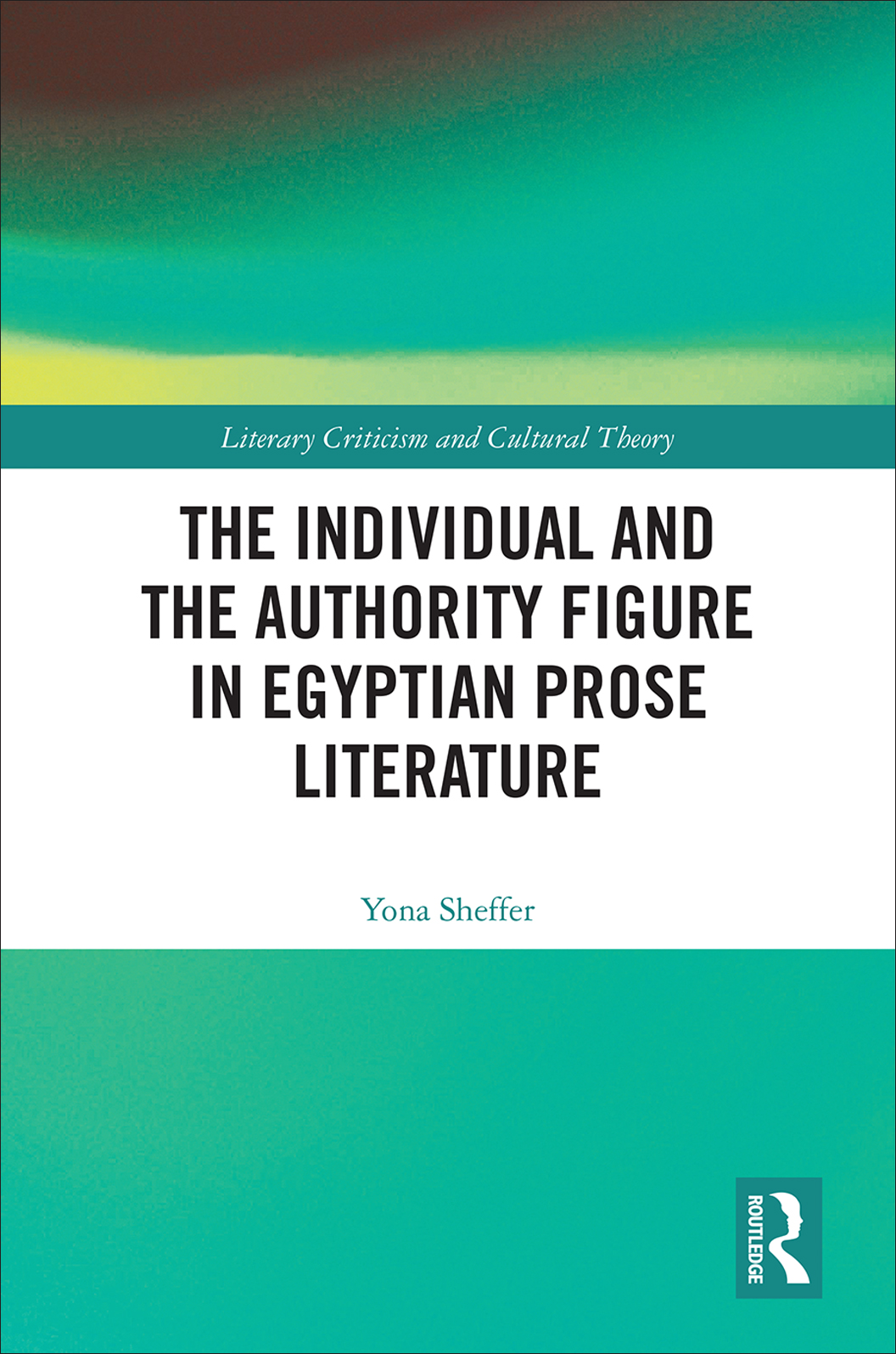
The Individual and the Authority Figure in Egyptian Prose Literature
The Individual and the Authority Figure in Egyptian Prose Literature explores and analyses political conflicts between individuals and authority figures, as those conflicts are depicted in thirteen Egyptian novels written from 1957 to the last years of Mubaraks presidency. The book discusses the various reasons that lead an individual or a group of people from all strata of society (common people, intellectuals, and public figures) to confront policemen, senior security officials, and even the heads of the state. It further examines how the conflicts develop and what their outcomes are in the short term as well as in the long term, for both the individuals and the authority figures. In this context, the volume also examines the possibility of standing against an oppressive regime and even overcoming it.
This text argues that while the authority figure initially subdues individuals who confront them, their victory is short term. In the long term, their cruelties bring about sown deaths, either by the individuals themselves or by their relatives. Furthermore, large assemblies of people can confront the regime with success. These discoveries, along with other findings presented in the book, remain relevant to the reality in the Middle East and the events leading to the Arab Spring.
Yona Sheffer received her Ph.D. from the Hebrew University of Jerusalem, the Department of Arabic Language and Literature. Dr. Sheffer currently teaches Introduction to Arabic Literature at The Polis Institute of Languages and Humanities in Jerusalem and is Assistant Researcher for the Department of Islamic and Middle Eastern Studies, The Hebrew University of Jerusalem. Recent publications include The Individual versus Officialdom in Egyptian Prose Fiction since the 1952 Revolution, Tel-Aviv: Resling, 2015 (Hebrew), and a Translation from Arabic to Hebrew of an autobiography by Meir Muallem: A Piece of Life: Memoirs from Iraq (Jerusalem: Association of Jewish Academics from Iraq, 2011).
Literary Criticism and Cultural Theory
The Waste Fix
Seizures of the Sacred from Upton Sinclair to the Sopranos
William G. Little
Figures of Finance Capitalism
Writing, Class and Capital in Mid-Victorian Narratives
Borislav Knezevic
The Other Orpheus
A Poetics of Modern Homosexuality
Merrill Cole
The Individual and the Authority Figure in Egyptian Prose Literature
Yona Sheffer
First published 2018
by Routledge
711 Third Avenue, New York, NY 10017
and by Routledge
2 Park Square, Milton Park, Abingdon, Oxon OX14 4RN
Routledge is an imprint of the Taylor & Francis Group, an informa business
2018 Taylor & Francis
The right of Yona Sheffer to be identified as author of this work has been asserted by her in accordance with sections 77 and 78 of the Copyright, Designs and Patents Act 1988.
All rights reserved. No part of this book may be reprinted or reproduced or utilised in any form or by any electronic, mechanical, or other means, now known or hereafter invented, including photocopying and recording, or in any information storage or retrieval system, without permission in writing from the publishers.
Trademark notice: Product or corporate names may be trademarks or registered trademarks, and are used only for identification and explanation without intent to infringe.
Library of Congress Cataloging-in-Publication Data
Names: Sheffer, Yona, 1972- author.
Title: The individual and the authority figure in Egyptian prose literature / by Yona Sheffer.
Other titles: Pert u-milamto be-vaale ha-samkhut ba-sifrut ha-Mitsrit me-az mahpekhat 1952. English
Description: New York: Routledge, 2018. |
Series: Literary criticism and cultural theory | Based on the authors dissertation (doctoral)Hebrew
University, 2015. | Includes bibliographical references and index.
Identifiers: LCCN 2018005391
Subjects: LCSH: Arabic fictionEgyptHistory and criticism. | Arabic fiction20th centuryHistory and criticism. | Authoritarianism in literature. | Individualism in literature.
Classification: LCC PJ8212 .S52513 2018 |
DDC 892.7/3609962dc23
LC record available at https://lccn.loc.gov/2018005391
ISBN: 978-1-138-60019-5 (hbk)
ISBN: 978-0-429-47106-3 (ebk)
Typeset in Sabon
by codeMantra
To my parents, Aryeh and Sarah Sheffer
I have always been fascinated by the question of what makes individuals confront powerful authority figures, especially in corrupt regimes, and whether there is any chance of defeating them. Developments in the Middle East today the Arab Spring in particular demonstrate more than ever how relevant this question still is.
The stimulus for my study of these questions comes from modern Arabic literature, especially the works of the Egyptian writer Gamal al-Ghitani (19452015). One of the main issues occupying al-Ghitani is the relationship between ordinary people and those in power, especially those holding utmost power in terms of Orwells 1984. This theme is interwoven with the question: Are authority figures ordinary people? I believe that this question finds its answer in this book, side by side with the discussions of the various conflicts.
This book explores the nature of conflict between individuals and authority figures as those conflicts are depicted in the works of Egypts most notable writers from Nagib Mahfuz (19112006), whose long career started before the Revolution, to Ala al-Aswani (1957) who has gained acclaim mainly since the beginning of the 21st century.
The books four chapters can be divided into two parts: the first two chapters deal with the traits, worldviews, and general conduct of the authority figures and the individuals, while outline the conflicts including their motivating forces, development, immediate outcomes, and the long-term consequences.
Even though the book deals with the literary representation of a sociopolitical phenomenon, subjects and questions will arise that are likely to interest researchers who deal with the fields of society, politics, and history of Arab states. It is possible that the findings in this book will stimulate researchers to analyze these subjects with other tools and disciplines in order to discover whether the literary reality matches the historical reality.
I have spent several years reading the raw material for this book, analyzing hidden messages (since some of the authors obscure their ideas in order to avoid censorship) and merging the findings. The research culminated in my doctoral dissertation submitted to the Hebrew University of Jerusalem. The English version includes some new insights gained from rereading and rethinking the research.
* * *
This book could not have seen the light of day without the help of my teachers and friends. Special thanks are due to my mentors, Prof. (Emer.) Gabriel M. Rosenbaum and Prof. (Emer.) Menahem Milson from the Hebrew University of Jerusalem for their encouragement, direction, corrections, and critiques. I would also like to thank Prof. Meir Hatina from the Hebrew University of Jerusalem and Prof. Fruma Zachs from The University of Haifa for encouraging me to publish the book and for their helpful remarks in order to improve the manuscript. I have a debt of honor to my friends Amina Sayyad, Dr. Moshe Terdman, and Doron Goldstein for the ideas they shared with me and for their assistance in my formulation of them. I wish to thank the two anonymous reviewers found by Routledge for their most helpful comments about the manuscript. I am especially grateful to Marcy Gayer for copyediting the manuscript. Last, but not least, I am indebted to Routledge and Editors Michelle Salyga and Timothy Swenarton for the willingness to publish this book and escorting it through the publication process.
Font size:
Interval:
Bookmark:
Similar books «The Individual and the Authority Figure in Egyptian Prose Literature»
Look at similar books to The Individual and the Authority Figure in Egyptian Prose Literature. We have selected literature similar in name and meaning in the hope of providing readers with more options to find new, interesting, not yet read works.
Discussion, reviews of the book The Individual and the Authority Figure in Egyptian Prose Literature and just readers' own opinions. Leave your comments, write what you think about the work, its meaning or the main characters. Specify what exactly you liked and what you didn't like, and why you think so.

